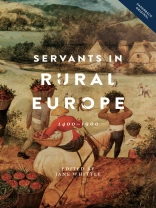This is the first book to survey the experience of servants in rural Europe from the fifteenth to the nineteenth century.
This is the first book to survey the experience of servants in rural Europe from the fifteenth to the nineteenth century. Live-in servants were a distinctive element of early modern society. They were typically young adults aged between 16 and 24 who lived and worked in other people’s households before marriage. Servants tended to be employed for long periods, several months to years at a time, and were paid with food and lodging as well as cash wages. Both women and men worked as servants in large numbers. Unlike domestic servants in towns and wealthy households, rural servants typically worked on farms and were an important element of the agricultural workforce. Historians have viewed service as a distinct life-cycle stage between childhood and marriage. It brought both freedom and servility for young people. It allowed them to leave home and earn a living before marriage, whilst learning a range of agricultural and craft skills which reduced their dependence on their parents and increased their choice in marriage partners. Still, servants had limited rights: they were under the authority of their employer, with a similar legal status to children. In many countries the employment of servants was tightly controlled by law. Servants could demand their wages, and leave when the contract ended, but had to work long hours and had little say in their work tasksduring employment. While some servants effectively became family members, trusted and cared for, others were abused physically and sexually by their employers. This collection features a range of methodologies, reflecting the variety of source materials and approaches available to historians of this topic in a range of European countries and time periods. Nonetheless, it demonstrates the strong common themes that emerge from studying servants and will be of particular interest to historians of work, gender, the family, agriculture, economic development, youth and social structure.
JANE WHITTLE is Professor of Rural History at the University of Exeter.
Contributors: CHRISTINE FERTIG, JEREMY HAYHOE, SARAH HOLLAND, THIJS LAMBRECHT, CHARMIAN MANSELL, HANNE ØSTHUS, RICHARD PAPING, CRISTINA PRYTZ, RAFFAELLA SARTI, CAROLINA UPPENBERG, LIES VERVAET, JANE WHITTLE
विषयसूची
Introduction: Servants in the Economy and Society of Rural Europe – Jane Whittle
The Employment of Servants in Fifteenth- and Sixteenth-Century Coastal Flanders: A Case-Study of Scueringhe Farm near Bruges – Lies Vervaet
The Institution of Service in Rural Flanders in the Sixteenth Century: A Regional Perspective – Thijs Lambrecht
A Different Pattern of Employment: Servants in Rural England c.1500-1660 – Jane Whittle
Female Service and the Village Community in South-West England 1550-1650: The Labour Laws Reconsidered – Charmian Mansell
Life-cycle Servant and Servant for Life: Work and Prospects in Rural Sweden c. 1670-1730 – Christina Prytz
Servants in Rural Norway, c.1650-1800 – Hanne Osthus
Rural Servants in Eighteenth-Century Münsterland, Northwestern Germany: Households, Families and Servants in the Countryside – Christine Fertig
Rural Servants in Eastern France 1700-1872: Change and Continuity over Two Centuries – Jeremy Hayhoe
The Servant Institution during the Swedish Agrarian Revolution: The Political Economy of Subservience – Carolina Uppenberg
Farm service and hiring practices in mid nineteenth-century England: The Doncaster Region in the West Riding of Yorkshire – Sarah Holland
Dutch Live-In Farm Servants in the Long Nineteenth Century: The Decline of the Life-Cycle Service System for the Rural Lower Class – Richard Paping
Rural Life-Cycle Service: Established Interpretations and New (Surprising) Data: The Italian Case in Comparative Perspective (Sixteenth to Twentieth Centuries) – Raffaella Sarti
Select Bibliography
लेखक के बारे में
THIJS LAMBRECHT is Lecturer in Rural History at the University of Ghent.











